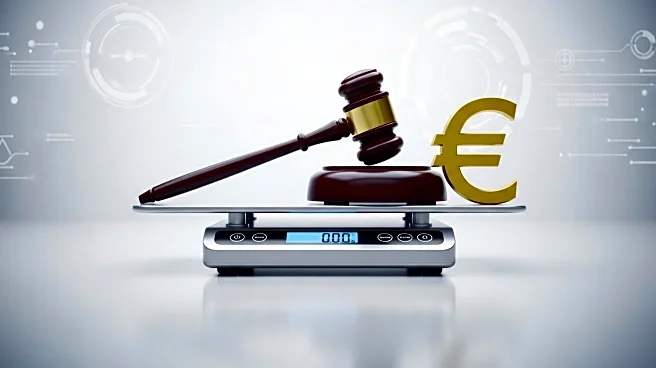What is the story about?
What's Happening?
Meta Platforms Inc. is facing potential charges from the European Union for not adequately policing illegal content on its platforms, Facebook and Instagram. The European Commission is preparing to issue preliminary findings that Meta lacks a sufficient 'notice and action mechanism' for users to flag illegal posts for removal. This development is part of an ongoing probe initiated by the EU's executive branch in April 2024. If the findings are confirmed, Meta could face fines up to 6% of its annual global sales. The company will have an opportunity to offer remedies or contest the allegations. Meta's spokesperson, Ben Walters, has stated the company disagrees with the suggestion that it breached the Digital Services Act (DSA) and is in negotiations with EU officials.
Why It's Important?
The EU's actions against Meta highlight the increasing regulatory scrutiny faced by large tech companies regarding content moderation. The Digital Services Act mandates platforms with over 45 million monthly active users in the EU to implement robust measures against illegal or harmful content. This case underscores the tension between the EU and U.S. tech giants, with President Trump previously accusing the DSA of unfairly targeting American companies. The outcome of this case could set a precedent for how tech companies manage content and interact with regulatory bodies, potentially influencing global content moderation policies.
What's Next?
Meta is expected to respond to the EU's preliminary findings, either by offering remedies or contesting the allegations. The EU's decision could lead to significant financial penalties for Meta, impacting its operations and strategies in the region. Other major platforms, including TikTok and X, are also under scrutiny, indicating a broader enforcement of the DSA. The tech industry will be closely watching the proceedings, as they may influence future regulatory approaches and compliance requirements.
Beyond the Headlines
The EU's actions may prompt discussions on the balance between free speech and content regulation, especially concerning the role of tech companies in moderating user-generated content. The case could also lead to debates on the sovereignty of digital spaces and the jurisdictional reach of regulatory bodies over global platforms.















